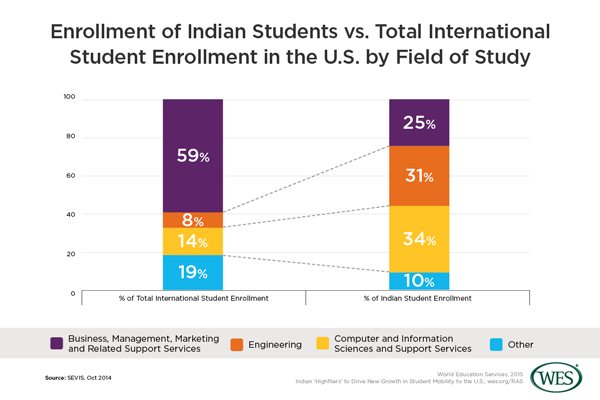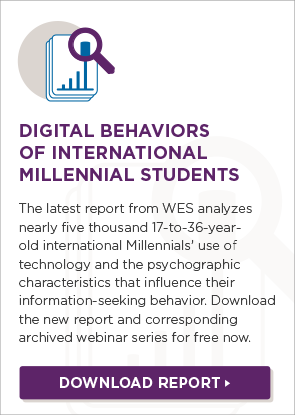By Rahul Choudaha, Research & Advisory Services, WES
Understanding and predicting the global mobility and enrollment patterns of Indian students has always been a tricky affair. For example, the number of Indian students enrolled in U.S. institutions of higher education has been stagnant for the last five years [1]. However, this trend looks set for positive change due to the emergence of a new segment of Highflier students [2] who are likely to be both academically prepared and financially independent to pursue educational opportunities in the U.S. across a broad range of fields and at all levels of study.
According to WES’ segmentation framework of international students [3], which groups students into four categories —Highfliers, Explorers, Strivers and Strugglers—Indian students are most likely to be Strivers. They seek “value for money” and are highly dependent on bank loans or financial support from universities. Strivers also tend to enroll in fields of study that have good employment potential. For example, many students begin their studies in the U.S. with the goal of working in the information technology (IT) services sector. They start by enrolling in master’s level programs in STEM-related fields [4], follow it with a 29-month Optional Practical Training (OPT) experience in the IT industry and finally seek H1-visas for employment. In 2013/14, 27 percent of all Indian students in the U.S. were on OPT as compared to 12 percent of all international students. The majority are concentrated in large US metro areas [5] with ample IT jobs like New York and San Jose.
In contrast to the traditional value-for-money orientation of Indian Strivers, a new emerging segment of Indian Highfliers will be more inclined to seek quality of experience over other considerations when applying to U.S. universities. Highfliers will not be as financially constrained as Strivers and will be ready to invest in fields of study beyond STEM degrees. The Indian Highflier market is emerging due to economic growth and associated transformations to the structure of Indian society. The economic liberalization [7] and growth of new sectors like the IT services industry during the 1990’s has created a new class of well-compensated white collar professionals. The Highflier children of these professionals are now getting ready for college [8] and will become the main drivers of international mobility among Indian students.
The growth in the number of Highflier students from India will take a few years to fully impact overall enrollment patterns, and it will not be as marked as the explosion of Explorer students from China [9]; however, forward-looking institutions would be well placed to make the most of this emerging opportunity by informing and adapting their internationalization strategies to the unique characteristics, needs and decision-making processes of Indian Highflier students.
Previous Mobility Monitors
- Malaysia: Shifting Mobility with Branch Campuses [10]
- Sub-Saharan Africa as an Emerging Market for Millennial Students [11]
- Brazil: Pathways for the Future [12]
WES in the News
- CBU Enrollment Gets Boost from Kuwaiti Students [13], The Commercial Appeal
- Going International [14], American Council on Education’s The Presidency Magazine
- US Still the Favourite with Indian Students [15], The Economic Times


